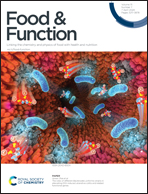Improvement of hepatic innate immunity in chemically-injured livers to develop hepatocarcinoma by a serine type-protease inhibitors enriched extract from Chenopodium quinoa†
Abstract
Food ingredients have critical effects on the maturation and development of the immune system, which innate – lymphoid (ILCs) and myeloid – cells play key roles as important regulators of energy storage and hepatic fat accumulation. Therefore, the objective of this study is to define potential links between a dietary immunonutritional induction of the selective functional differentiation of monocytes-derived macrophages, ILCs and lipid homeostasis in hepatocarcinoma (HCC)-developing mice. Hepatic chemically injured (diethylnitrosamine/thiacetamide) Rag2−/− and Rag2−/−Il2−/− mice were administered with serine-type protease inhibitors (SETIs) obtained from Chenopodium quinoa. Early HCC-driven immunometabolic imbalances (infiltrated macrophages, glucose homeostasis, hepatic lipid profile, ILCs expansion, inflammatory conditions, microbiota) in animals put under a high-fat diet for 2 weeks were assessed. It was also approached the potential of SETIs to cause functional adaptations of the bioenergetics of human macrophage-like cells (hMLCs) in vitro conditioning their capacity to accumulate fat. It is showed that Rag2−/−Il2−/− mice, lacking ILCs, are resistant to the SETIs-induced hepatic macrophages (CD68+F4/80+) activation. Feeding SETIs to Rag2−/− mice, carrying ILCs, promoted the expansion towards ILC3s (CD117+Nkp46+CD56+) and reduced that of ILC2s (CD117+KLRG1+) into livers. In vitro studies demonstrate that hMLCs, challenged to SETIs, develop a similar phenotype of that found in mice and bioenergetic adaptations leading to increased lipolysis. It is concluded that SETIs promote liver macrophage activation and ILCs adaptations to ameliorate HCC-driven immunometabolic imbalances.



 Please wait while we load your content...
Please wait while we load your content...